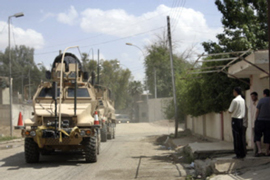Doubts linger over Mosul operation
Armed groups say arrests targeted political opponents instead of al-Qaeda fighters.

 |
| The Iraqi military arrested more than 1400 “suspects” during Operation Lion’s Roar in the northern city of Mosul [EPA] |
Several armed groups have questioned the motives behind the Iraqi government’s recent military operation in Mosul, 380km north of Baghdad.
Operation Lion’s Roar, which was launched on May 14, aimed to rid the city of al-Qaeda operatives who had regrouped in the region, according to the Iraqi military.
Tariq al-Hashemi, the country’s vice-president and the leader of the Iraqi Islamic Party, said that the operation “achieved its targets” in the first 10 days, with more than 1400 “suspects” arrested.
But the Political Council of the Iraqi Resistance, an umbrella group of armed factions opposed to the US presence in the country, disputed the government’s claim that Mosul had become an al-Qaeda stronghold.
In a statement sent to Al Jazeera, the Council said the military operation was used as a “false pretext” launched by the country’s ruling quintet – the al-Dawa Party, the Islamic Supreme Council of Iraq, the Kurdistan Democratic Party, the Patriotic Union of Kurdistan and al-Hashemi’s Islamic party – to eliminate their political and ideological opponents in the city ahead of upcoming elections.
Pre-planned arrests?
 |
| Tariq al-Hashemi, left, said the Mosul operation had achieved its targets and routed al-Qaeda |
Critics of the military operation point to the ease with which the operation was carried out, suggesting it was designed primarily as a series of pre-planned arrests.
Abu Omar, a field commander from one armed group within the Council said: “There was nothing we call [the] Mosul operation. There was no fighting, no gun fire, no battles, and the reason is they did not come to the city to fight.”
“They came to arrest the national figures who kept exposing the government and the occupiers’ evil plans to milk Iraq’s wealth and turn its citizens into beggars, refugees and overseas workers,” he added.
Usama al-Nujaifi, a a member of the political grouping headed by Iyad Allawi, the country’s former prime minister, also played down government claims that al-Qaeda had been controlling Mosul.
“There might be cells or a number of al-Qaeda fighters in Mosul, but in small numbers,” he told Al Jazeera.
“I think the idea that al-Qaeda has been controlling Mosul is exaggerated and the proof of that is that Iraqi forces entered the city without [a] fight and only carried [out] many arrests,” he said.
Targeting opponents
The 1920 Revolution Brigades, an armed Iraqi opposition group, told Al Jazeera that the main purpose of the operation was to silence those who oppose the US occupation.
“Most of those arrested were wanted not because they are al-Qaeda members but because they are nationalists who refuse the occupation and the sectarian government of Nouri al-Maliki, the prime minister.”
“They were not fighters. They were sitting at home and were apprehended. If they are like how they were described by the government they would have fought or relocated themselves to avoid arrest,” Abd Allah al-Umari, a spokesman for the 1920 Revolution Brigades, said.
Abu Muhammad, a spokesman for the former ruling Baath party, which now maintains a presence in exile, said that more than 70 per cent of the men arrested during Operation Lion’s Roar were former party members.
“Most of them are former army officers and professionals. They do not exercise any political activity in the present time, and definitely they are not al-Qaeda fighters,” he told Al Jazeera in a telephone interview.
Appeals from residents
 |
| Some Iraqi politicians said Mosul residents called for increased security in the city [AFP] |
Major-General Mohamad al-Askari, a spokesman for the Iraqi ministry of defence, and Major-General Abd al-Karim, a spokesman for the ministry of interior, were not available to comment on the operation which concluded in late May.
But the Iraqi Islamic Party denied that the Iraqi army and security forces were being used in a bid to secure election success.
Iyad al-Samarie, the vice chairman of the Iraqi Islamic party, stressed his party’s support for the operation, adding that intelligence reports indicated that al-Qaeda had been pushed out of al-Anbar and Diyala provinces and forced to flee to Mosul.
“We cannot say for sure how many of them were active in Mosul, but we did receive complaints from Mosul residents and appeals to save the city from al-Qaeda people,” he told Al Jazeera.
“We are in direct and constant contact with the people of Mosul. Our MPs are going to investigate if there were any illegal or unfair arrests and we are in contact with the government to release any possible innocent prisoners.
“However, I would like to say that such operations might involve some mistakes, but the subsequent interrogation should settle everything.”